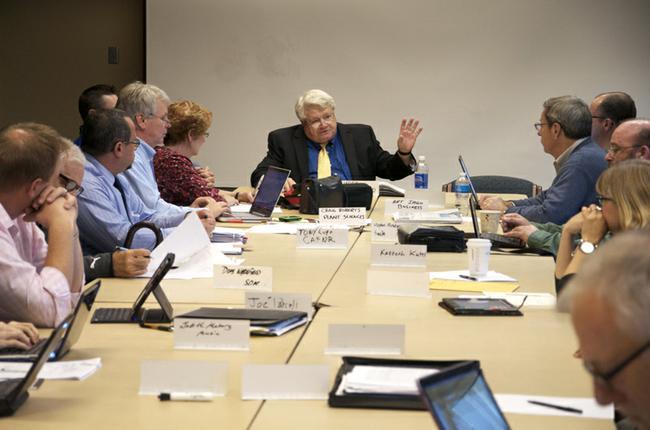
The UM Press advisory committee, formed to aid the firm in its transition to the MU campus, held its first meeting Oct. 17.
Plant sciences professor Craig Roberts provided a summary of the group’s discussion at Thursday’s Faculty Council meeting. Roberts emphasized, among other things, the abundance of new information there was to offer.
“Everything that was said (about the press) was new,” Roberts said. “There were just so many new sentences there.”
The advisory committee meeting was led by UM System President Emeritus Mel George and MU Chancellor Emeritus Richard Wallace. The two men began the discussion by handing out histories of the UM Press for members to read, Roberts said. They emphasized the importance of learning about the business.
Additionally, Roberts said new ideas about what the press could become were discussed. Chief Academic Officer Brian Foster mentioned the press could potentially borrow from the School of Journalism and employ students. Roberts also emphasized the committee brought up the possibility of producing more content from different fields.
As a professor who admits there hasn’t been much content come from his area of study, Roberts said it’s something they could definitely “tap into.”
“It’s all about content,” Roberts said. “We’re sitting here on content central, and it’s filtering out to (other places).”
Roberts expressed his happiness with the first meeting to the Faculty Council.
“At this point, it’s a very open-minded group,” Roberts said. “And to be honest with you, I’m learning a lot more than I thought I would.”
Consulting Director of the UM Press Jane Lago was also at the meeting. Lago, who has voiced concern about the future of the business in the past, feels much better after the discussion.
“I think it went very well,” Lago said. “It was a good meeting because everyone there, everyone around the table, was able to talk openly about what the press’ strengths are and what the press’ strengths should be.”
Lago said there’s no longer a question of “whether there should be a press” but rather discussion about “how to make the best possible press.” She explained how they talked about the firm’s national reputation and that it should try to highlight MU’s strengths.
Although she said in August that she was “not optimistic” about the press, Lago said she has a better feeling about the future of the firm. She said since Editor-in-Chief Clair Willcox was re-hired, many authors have decided to stick with the press. She even said Willcox talked personally with many of them about their concerns.
Lago is for the most part “encouraged” about the future of the institution.
“Right now we only have a staff of seven, so we have our work cut out for us,” Lago said. “But I think things are definitely looking up.”
Roberts mirrored this sentiment to the Faculty Council.
“There is a feeling that (the press) may come out the other end better than if it hadn’t gone through this,” Roberts said.